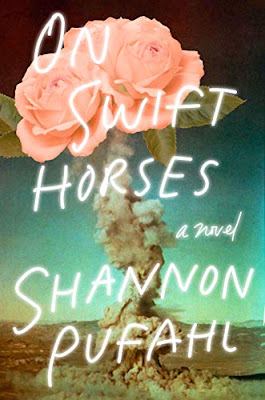 |
| New York : Riverhead Books, 2019 |
Pufahl's achingly good prose draws the reader into an intensely emotional world where the characters must make difficult decisions in order to survive; often telling lies to those they love as well as to themselves. Taking place in the newly forming suburbs of San Diego, Las Vegas and Tijuana, the characters are running both toward and away from aspects of their lives while in search of their true selves.
References to cinema of the time, especially as it relates to sex and gender presentation (ie. the western, Shane and the Marlene Dietrich film Morocco), provide a movie-like quality where the reader truly feels the story. As well, the space race, particularly the successful launch of Sputnik, and general imagery of the stars is used to speak of the future and the impossibility of keeping secrets when satellites see all that we do. The beginnings of a surveillance state are upon us.
Although underplayed by the author, the massive social changes that occurred post World War II in the United States play a crucial part in the characters lived experience. During World War II, women were needed in the workforce for the war effort and a certain amount of freedom came from that. After the war ended, expectations changed. What women were supposed to want and the roles they played were in many ways not up for discussion. Muriel's mother was able to live a life of her own making. Her daughter now finds herself with fewer perceived choices than her mother had.
The McCarthy hearings brought significant attention to gay men as a social problem. One of the characters in the book actually says that without Joseph McCarthy, most Americans wouldn't know about fairies and reds. By the time the Korean War had ended, whatever freedom gay men and lesbians felt in their invisibility, they were now receiving substantial societal pushback; and everyone, not just those in big cities, were now aware of their existence. Julius was living a life both as a gambler and a gay man where he was always in physical danger as well as danger of societal judgement should he be discovered.
No comments:
Post a Comment